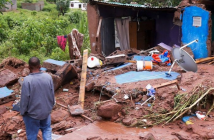Opinion
Cities are major contributors to climate change — but they also have the power to change the world. They are essential to addressing the global climate change crisis and some of them, informed by science, are already doing so. More cities must follow in the footsteps of those who are taking action.
The global desire and capacity for change is strong, as demonstrated by the millions of people worldwide taking to the streets demanding climate action. This call for action will be at the forefront of the 25th Conference of the Parties (COP25) to the United Nations Framework Convention on Climate Change taking place December 2-13 in Madrid. This critical annual meeting brings the international community together to share solutions, galvanise momentum, and to track progress towards the Paris Agreement climate commitments.
We must seize upon these opportunities for collaboration and solution-sharing as the scale and frequency of climate change-related crises continue to grow.
In Africa, and particularly in the Sahel, consequences of climate change are real and significantly affect community livelihoods: crop losses, increased frequency and intensity of floods, increased risks of livestock diseases, increased epidemics of infectious diseases to which children are particularly vulnerable, and increased recurrence of droughts leading to more frequent water shortages in urban and agricultural supply systems.
For states with national economies still largely relying on rainfall, climate change is a serious obstacle to achieving the Sustainable Development Goals (SDGs) and those of the African Union’s Agenda 2063. The time for action is now.
Strengthening climate action in cities
Why the focus on cities, and why now? Because of the accelerating pace of urbanisation.
By 2050, two-thirds of the world’s population will live in cities. Cities are already home to more than half the world’s population and the majority of infrastructure, assets, and economic activity. They consume 78% of global energy and account for more than 60% of greenhouse gas emissions. Yet, they cover only 2% of the world’s surface.
Strong evidence is available to inform local and national governments so that they design resilient cities and mitigate their impact. For vulnerable people living in and around the cities, in particular for women and girls, this may prove a matter of life and death.
Cities must invest in research to understand their unique challenges, how their citizens are affected, and what localised solutions are best-suited to their context.
Climate change is a key topic that will be explored further at African Utility Week and POWERGEN Africa conference. Click here to register to attend or for more information about the event.
Implementing research findings for resilient cities
When a city is hit with flooding, record rainfalls, and other extreme and damaging weather events, the necessary focus on a crisis response can cloud the bigger picture, which reveals the common ground between the challenges — and solutions — that exist worldwide.
Proven solutions, backed by rigorous science, exist to many of the climate shocks and stresses facing at-risk cities. Many of them are inexpensive, simple and nature-oriented. Throughout sub-Saharan Africa, urban planners and regional leaders have been working for years to build their capacity to anticipate, adapt, and persevere. In addition to these efforts, city-level, secure financing is needed to address climate change.
If we are to meet the global commitment to “leave no one behind”, we must tackle the multiple dimensions contributing to urban poverty, vulnerability, and inequality. This means amplifying the commitment to our global climate that will be on display at COP25 in Madrid so that it infuses political, policy, research, and investment agendas worldwide with the imperative need for action.
Author: Santiago Alba-Corral and Julie Crowley from IDRC
Santiago Alba-Corral is the director of the Agriculture and Environment Programme at the International Development Research Centre (IDRC).
Julie Crowley is the director of the Regional Office for West and Central Africa at IDRC.
This article was originally published on ESI Africa and is republished with permission with minor editorial changes.
Disclaimer: The articles expressed in this publication are those of the authors. They do not purport to reflect the opinions or views of Green Building Africa, our staff or our advertisers. The designations employed in this publication and the presentation of material therein do not imply the expression of any opinion whatsoever on the part Green Building Africa concerning the legal status of any country, area or territory or of its authorities.















